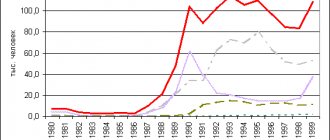Options for moving to Europe from Russia for permanent residence
There are several of these options:
- marriage to a citizen of a European country;
- family reunification – for those whose close relatives live in Europe;
- employment at the request of the employer;
- emigration for political, national or religious reasons.
In this case, the country is selected based on the level of well-being of its citizens, economic stability, cost and time frame for obtaining permanent residence status, climate, and personal preferences.
Clarification: refugees emigrating for various reasons should first clarify what requirements the chosen country imposes on these categories of foreigners.
All immigration methods
Foreigners can move to the EU if they have one of the legal grounds. The most popular among them are described below: repatriation, training, employment, starting a business and investment. Less popular ones include family reunification, marriage with a citizen or permanent resident of the state, and refugee. Regardless of the chosen reason for moving to Europe, immigration comes down to three possible options for obtaining a passport - naturalization, investment or repatriation.
Repatriation
The term “repatriation” means the return to their historical homeland of the descendants of former citizens of a particular country who have lost their legal status during political events. This method of immigration is suitable for those who can document that their direct relative was European or lived in a territory defined by law. Repatriation programs allow you to obtain citizenship relatively quickly and easily (without prior registration of a residence permit or permanent residence permit). The procedure for restoring citizenship is provided for only in a few EU countries, including Romania, Bulgaria, Poland, Lithuania, Latvia, Slovenia and Estonia.
Education
Enrollment of a foreigner in any European university serves as the basis for applying to the consulate or visa center for a long-term visa. Upon arrival in the country of study, the student submits an application to the migration authority and receives a residence permit. Typically, the residence permit is valid for 1 year and can be extended if the foreign student provides documentary evidence of successful study. One of the main advantages of this method of immigration is obtaining an educational diploma that is recognized throughout the EU. But it is also the longest path to citizenship (in most countries, the period of study does not count towards the total period of residence).
Employment
To leave Russia, Ukraine, Belarus or another CIS country to work in the EU, you will first need to find a vacancy, prepare and send a resume, and pass an interview. If the candidacy of a foreign specialist is suitable, and there is not a single applicant with EU citizenship for the position, an employment contract is concluded. After this, the employer issues an invitation, the presence of which will allow the foreigner to request a long-term visa to enter the EU territory and obtain a residence permit. By working legally in Europe for 5 years, you can obtain permanent residence, and after another 5 years - citizenship by naturalization.
Buying a property
In most EU countries, purchasing a home does not give you the right to live in the place where the property was purchased. However, in Portugal, Greece, Spain and some other European countries, owners of expensive real estate and members of their families are granted a residence permit . This method of moving to Europe is suitable for wealthy immigrants who are willing to spend at least 250,000 EUR on the purchase of housing.
Starting a business
Opening a company from scratch or purchasing an existing business by foreigners in EU countries is one of the ways to obtain a residence permit. However, each state has its own rules and conditions for business immigration. Developed European countries place high demands on entrepreneurs. For example, immigrants who have business experience, have a minimum start-up capital of 250,000 EUR, propose a promising business idea and plan to create at least 5 jobs for citizens or permanent residents of the state can move to Germany and obtain a residence permit. Other, less economically developed, EU countries (Lithuania, Czech Republic, Poland, Bulgaria) offer more favorable conditions for business immigration to Europe. The amount of minimum investment in the authorized capital of the company and the monthly expenses for its maintenance are small, and the obtained residence permit will allow you to move freely throughout the European Union and establish business connections.
Investments
Wealthy foreigners have the opportunity to obtain a residence permit (Malta, Portugal, Greece, Latvia) or immediate permanent residence in Europe (Bulgaria) by investing in the economy of a certain EU country. Under the terms of investment programs, applicants are required to prove their reliability through the Due Diligence legal procedure, confirm the legality of the origin of funds and make a contribution from 250,000 to 850,000 EUR. To become a resident of an EU country, investors do not need to know the state language, and a residence permit is issued for their entire family.
Illegal immigration
Some foreigners come to Europe on a tourist visa or under the visa-free regime and remain there beyond the permitted period. Illegal stay in the EU risks an administrative fine, immediate deportation and a ban on entry for a specified period of time. The consequences largely depend on the duration of the violation and the country in which the “illegal immigrant” was detained. For example, Germany has the strictest immigration laws in this regard among all EU countries, and Greece imposes high fines on violators. This method of immigration is also dangerous because it can forever close the path to moving to Europe for permanent residence.
Do you want to live in Europe and travel freely around the world?
Contact us for a consultation with a migration lawyer
Where to move to Europe to start a business?
Conducting business in an unfamiliar country is not easy. On the other hand, the absence of corruption, sound tax policy and a loyal attitude towards beginning entrepreneurs make this process much more attractive than in Russian realities.
The most worthy opportunities in starting your own business are provided by:
- Bulgaria : fast start, low tax rates;
- Ireland : reasonable corporate tax, favorable conditions for beginners;
- Sweden : a clear process of transferring property and not burdened with excessive bureaucratic procedures, the opportunity to receive high incomes from small businesses;
- Netherlands : effective and tangible state support for small and medium-sized businesses;
- Norway : working small business support programs, the opportunity to quickly and without unnecessary steps open your own business online.
Why is Europe so popular?
European countries are distinguished by a high level of economic development, modern infrastructure, and stable incomes of the population.
The quality of medical care and education is much higher than in Russia. In EU countries it is possible to make a profitable deposit in a bank and get a loan at a low interest rate. A European residence permit gives the right to travel to all countries of the Schengen area without a visa.
Advantages and disadvantages of living in Europe
Advantages of moving to Europe:
- large assortment and high quality of products at reasonable prices;
- a good social package, including unemployment benefits;
- mild climate (in most countries);
- the quality of service in hospitals meets European standards;
- accessibility of education, relationship of programs with business needs, etc.
But there are also difficulties. The disadvantages of living in the EU are the language barrier (even if the choice fell on English-speaking countries), the influx of refugees that contribute to the growth of crime and unemployment, and the difficulty of finding employment.
Immigration statistics
Popular destinations for immigration to Europe from Russia:
- Germany;
- Poland;
- Finland;
- Czech Republic;
- Great Britain;
- Spain;
- Cyprus;
- Italy;
- France.
Rosstat reports that up to 500 thousand people leave the Russian Federation every year (including those who leave for the CIS, Europe, Asia and America). According to some estimates, the official data is greatly underestimated.
Moving to Europe for permanent residence to get an education
To move from Russia to Europe for permanent residence for this reason, it is not enough to choose a decent university and enroll in it. You should pay attention to the cost of training and compare this amount with your financial capabilities. This means that first of all you need to pay attention to countries that allow you to study for free.
Germany , the Czech Republic and Finland are ready to teach Russian applicants, provided they have excellent knowledge of the local language, without payment . And you can also get a master's degree for free in France , Spain , Sweden , Switzerland , and Italy .
Moving to the European Union: instructions for Russians, Ukrainians and Belarusians
Immigration to Europe should begin with choosing a country and becoming familiar with the rules for the entry and stay of foreigners in it. The most important thing in this case remains the choice of the basis on which an immigrant will be able to open a long-term visa and obtain the right to reside in the EU, as well as the possibility of further legalization. If the applicant does not have a basis for simplified citizenship by investment or repatriation, he will have to go through the entire path of standard naturalization, which consists of such stages as:
- Opening a visa.
- Registration of residence permit.
- Registration of permanent residence.
- Obtaining citizenship.
Opening a visa
A foreigner planning to move to Europe should contact the visa center or consulate of the EU country at his place of residence. You need to request a national long-term visa of category D. The list of documents required for submission will depend on the chosen basis, which can be found on the websites on immigration issues of EU countries. The issued visa is valid for 1 year and makes it possible to obtain a temporary resident card in Europe.
Registration of a residence permit
A residence permit is a permit for the temporary stay of a foreigner in a specific country. It is issued by the competent national immigration authority of a European state after entering the EU on a long-term visa type D. In most cases, the residence permit is issued for 1 year, and upon expiration it is subject to renewal. Having a temporary resident card gives a foreigner the right to live, study, work, do business, receive medical care and other social services within the country that issued the residence permit.
Registration of permanent residence
Permanent residence is a permit to stay in a specific country of the European Union, valid for 5 years with the possibility of extension. Holders of permanent residence have the same rights as citizens, with the exception of voting rights. Foreigners can obtain an EU permanent resident card after 5 years of residence in a European country with a residence permit. To do this, you will need to submit an application and accompanying documents to the competent national immigration authority of the selected state.
Obtaining citizenship
The final stage of legalization on the territory of a European state will be the registration of the status of an EU citizen. To obtain a passport, a foreigner must first reside in the country with permanent residence for about 5 years. For certain categories of applicants this period can be reduced to two years, but in Austria, for example, 15 to 30 years of permanent residence are required. EU citizenship provides free entry into more than 170 countries of the world, as well as the right to work, study, do business, social security, and medical care in the European Union.
Still have questions? our lawyers will advise you free of charge by phone
Permanent residence in Europe for investments in the economy and real estate
Russians with available funds can obtain permanent residence status by investing them in shares, government bonds, businesses, residential or non-residential real estate in a European country.
The most profitable countries in this regard seem to be Bulgaria , Latvia , Spain , Portugal , Malta , Greece and a number of others. Citizenship by investment is not possible in all of them. But getting a permanent residence permit, which certifies the status of a person residing on the territory of the state for a long time, is quite possible.
The choice of country for those applying for permanent residence for investment should be based on the amount of investment and the presence or absence of additional conditions.
Our recommendation: pay attention to Cyprus and Portugal . In the first case, you can get by with minimal investments and the absence of other conditions; in the second, you can get a permanent residence permit without the requirement for permanent residence in the country.
Popular European countries for emigration from Russia and the CIS
- Spain. A very popular country for emigration from the CIS countries and Russia. Ranks 22nd in terms of GDP. High real estate prices, good medicine, high salaries even for Europe. The problem is unemployment. It is very difficult for an immigrant to find a job in Spain, so people who work via the Internet (as programmers, designers, other IT specialists) often come here.
- Portugal. In terms of GDP, Portugal is in 55th place. Minimum salary 600 euros. You will receive it until you receive a residence permit. You can find work, but it involves construction, cleaning and working with tourists. The country attracts with its ecology, nature, low housing prices for Europe and a stable political situation. Problems include low levels of education, high crime rates in big cities and large fines for violations. Portugal is one of those countries where you can get a residence permit by settlement.
- Cyprus. GDP is weak - 111th place. But Cyprus is a small island, so the GDP per capita is large: $25,380 ($30,000 in the Russian Federation). Finding a job during the high tourist season is not difficult. During the low season there will be problems with work, but you can always earn extra money remotely. Many residents speak Russian and English. Low income taxes – 12.5%, offshore zone. Many come to Cyprus on a work visa and work with tourists from Russia. Investing in Cyprus real estate not only gives you the right to obtain a residence permit, but also to earn money when selling real estate after obtaining citizenship.
- Czech Republic. Center of Europe. 48th place in terms of GDP. Growth on average 3% from 2021. However, in terms of GDP per capita, the Czech Republic ranks first - $39,000. The average salary in the Czech Republic is 1,100 euros. An entrepreneur can organize a formal business and submit reports with a zero balance for 2 years in order to renew the residence permit. Free secondary and higher education for visitors. Five years for permanent residence and another five to obtain citizenship. Having received permanent residence, you can live in any European country.
- Poland. In 2021, it officially moved from developing countries to developed ones. Ranks 21st in terms of GDP with growth of 4.8% in 2021, 5% in 2021 and 3.7% in 2021. Inflation up to 2%. is in 34th place in terms of living standards. Poles are mentally close to citizens of Russia and the CIS. Polish is a Slavic language, which makes it easier to learn. Poland has low prices compared to other European countries and low salaries - from 500 to 1000 euros. A lot of work. The unemployment rate is only 3.3% for 2021. After 5 years you will receive permanent residence, and after another 3 years you will receive citizenship.
Comparison table current at the end of 2021
| Country (click for more information) | Rank by GDP | GDP per capita, nominal (in dollars) | Average salary (in euros) | Unemployed | Until permanent residence (before citizenship) in years |
| Portugal | 55 | $23 800 | 900 | 6.7% | 5 (10) |
| Spain | 12 | $29 875 | 2000 | 16% | Resident 3 years, permanent residence from 5 years |
| Cyprus | 111 | $25 380 | 1800 | 7.4% | 5 (5) + dual citizenship |
| Czech | 48 | $39 088 | 1100 | 1.9% | 5 (5) |
| Poland | 21 | $33 747 | 700 | 3.3% | 5 (3) |
Special programs for moving to Europe
Today they are offered by the Netherlands and Austria . You can get to Austria using the so-called red-white-red card. The applicant must prove that he will be useful to the country, for example, he has a rare profession or is a highly qualified specialist. The test has a point format. Points are awarded depending on education, age, profession, work experience, and language proficiency. The minimum threshold for obtaining a residence permit is 50 points.
According to young people with unconventional thinking, the best country in Europe for Russians to live is the Netherlands. There is a high standard of living here, legislation focused on people’s needs, a climate similar to many regions of Russia, and there is a special program for those who know how to come up with promising startups.
In this case, the facilitator (a person specializing in the analysis of business ideas) evaluates the value of a commercial project for the country’s economy, the adequacy of a business plan that allows for the implementation of this project, as well as the personal experience of the applicant - education, work experience, professional achievements, language skills, etc. significant parameters.
It is important to consider that in addition to the idea itself, it is necessary to find an investor who will provide financing for it at least at the initial stage - without this, a residence permit will not be issued.
Where is it better to go to Europe: TOP 5 countries for immigration
In most cases, people move abroad for personal reasons. Among the criteria by which immigrants choose EU countries as their new place of residence are the following:
- income level (the need to find employment and receive higher wages or open a business on optimal terms);
- socio-political situation (the desire to live in a country where there are no wars, armed conflicts and where human rights are respected);
- opportunities for children (the desire to provide them with the best education with the prospect of getting a good job upon graduation);
- social guarantees (the need for a higher level of medical care or pension payments);
- possibility of legalization (ease of obtaining resident status and obtaining citizenship).
TOP 5 best European countries for emigration in 2021, based on the above criteria and reviews of immigrants:
- Luxembourg - the minimum wage is the highest among EU countries and amounts to 2142 EUR.
- Slovenia is recognized as the safest country in the European Crime Index.
- Germany - universities in these countries, along with universities in Great Britain, are recognized as the best in the world;
- France - has the highest level of quality of medical care, according to the healthcare index for European countries;
- Romania - offers a relatively quick and simple procedure for obtaining citizenship.
Program for financially independent persons
This method of moving to Europe is optimal for those who have managed to accumulate substantial financial capital and now just want to live it in comfortable conditions. This program is also eagerly used by freelancers from various fields of activity, managers who control their Russian business remotely, and wealthy Russians seeking to give their children a high-quality European education.
The program is especially convenient because you can bring your family with you, including minor children. The main condition is that the housing purchased or rented meets the standards for the number of residents, and the available amount of savings allows them to live comfortably in Europe. Any country is suitable for moving under this program.
So, there are different ways to move for permanent residence from Russia to a European country.
Which one to choose is up to you. Our team can only recommend the optimal one, having previously studied the existing conditions and circumstances. And also provide assistance in preparing documents and organizing the process. Why did I leave Russia for Europe? The easiest way to move to Europe.
Pros and cons of living in Europe
In fact, it does not matter which EU country you obtain citizenship of - according to Directive 2004/38/EC, you can live in any of the 27 member states with an EU passport. Freedom of movement is the main advantage of moving to Europe.
Other benefits of immigration to European countries:
- improved financial situation - the minimum wage in the EU countries is higher than in the CIS countries, and working conditions are safer (monthly income in Luxembourg - from 2000 euros, the Netherlands, Ireland - from 1600 euros, Belgium, Germany, France - from 1500 euros) ;
- good environmental situation - the governments of European countries invest significant resources to improve the state of the environment, all actions are regulated by the Decision of the European Parliament and the Council (No. 1600/2002/EC of 22.07.2002);
- future for children - education in Europe is one of the highest quality in the world, which allows you to receive an international diploma that does not require confirmation (nostrification or evaluation in other countries);
- ample opportunities for travel - EU residents and citizens have unhindered travel throughout European countries, for example, with a German passport you can cross the borders of 189 states without issuing visas;
- high-quality medical services - most European countries offer residents fully subsidized healthcare services (according to WHO, the most accessible for treatment are France and Italy).
Despite its many advantages, living in Europe has several disadvantages:
- high taxes - in some European countries the level of taxation is very high (for example, in Germany, 45% of the total amount will have to be subtracted from an income of 285,000 EUR) and such personal income tax indicators greatly affect the financial situation of many people;
- high cost of living - prices for real estate, industrial goods, food in Europe are usually higher than in most countries of the world (the most expensive EU countries are Luxembourg, Denmark, Ireland);
- language - very few people speak any language other than the local one, which can create communication problems (at least a reasonable level of English, French or German is required (A1-B2)).
Are you planning to immigrate?
Difficulties of direct relocation
Why is it difficult to move directly to top European countries? Due to the large influx of applicants in past years, governments were forced to introduce strict quotas for issuing residence permits or citizenship. For example, in 2014 an anti-migration referendum was held in Switzerland.
Most countries do not have programs that provide formal status for investment. Therefore, it is possible to obtain citizenship or a residence permit there only on a general basis: employment, marriage, repatriation, etc.
How to pay taxes?
In the European Union, you pay taxes where you permanently reside. Therefore, even if you have a Cypriot or Maltese passport, and you live in Germany or France, your tax obligations (as an individual) appear precisely to the German or French side. Exactly what taxes you will have to pay and in what volume depends on the specific country.











